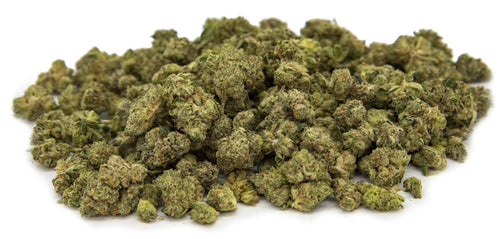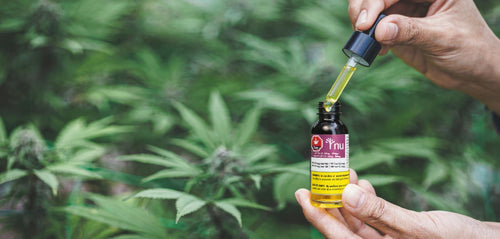#18: Unleashing the Power of CBD: A Comprehensive Guide
#18: Unleashing the Power of CBD: A Comprehensive Guide
When Sanjay Gupta's groundbreaking documentary WEED first aired on CNN in 2013, it changed the way the general public thought about cannabis and its potential for medicinal use. The documentary put the spotlight on medical cannabis and Charlotte Figi, a child suffering from a severe form of epilepsy, whose life was transformed by the plant. Charlotte's seizures had previously been untreatable, but after taking a cannabis tincture, they declined dramatically from approximately 300 a week to only 2 or 3 per month.
What specifically was it that Charlotte Figi was using? The answer is CBD, or cannabidiol, one of the primary active compounds found in cannabis. CBD is responsible for many of the therapeutic benefits associated with cannabis, including pain relief and seizure suppression, without producing the psychoactive effects that come from THC (tetrahydrocannabinol).
Since the airing of WEED, public interest in the medicinal use of CBD has skyrocketed, leading to a surge in the number of studies conducted into its potential benefits. Today, there is now a wealth of evidence supporting the use of CBD as an effective treatment for numerous health conditions. In this article, we will discuss what CBD is, how it works in the body, its potential medicinal uses and benefits, how to use it safely and effectively, and more. So, let's get started!
Breaking down the basics: What is CBD?
First isolated from cannabis in 1940 by Roger Adams, it wasn't until the 1960's that the chemical structure of CBD was fully identified. Prior to this, scientists used THC as the main source of research and excluded CBD due to its non-psychoactive properties, which downplayed its potential therapeutic benefits for years.

CBD is one of the 113 cannabinoids found in the Cannabis Sativa plant. It is the second most abundant cannabinoid, after THC. Unlike THC, however, CBD does not produce a psychoactive effect when consumed; instead, it has been found to exert a variety of therapeutic effects in the body.
The human body has an entire system called the endocannabinoid system (ECS), which is largely responsible for keeping the body in balance and promoting homeostasis. The ECS is made up of various receptors, enzymes, and endocannabinoids which interact with one another to help regulate different processes. CB1 and CB2 receptors are the two main types of receptors that interact with cannabinoids from the cannabis plant, like CBD.
When CBD enters the body, it interacts with these receptors by either activating or inhibiting them. This interaction causes a variety of effects in the body, depending on the type of receptor that is activated and the dose used. For example, CBD has been found to reduce inflammation by activating CB2 receptors, while also decreasing anxiety by inhibiting CB1 receptors.
With its various potential therapeutic benefits, CBD has become increasingly popular over the past few years, particularly among those looking for natural alternatives to traditional medications. So, let's take a look at the potential medicinal uses and benefits of this remarkable compound.
Unlocking the potential of CBD: Benefits and uses
As more research is conducted into the therapeutic potential of CBD, an increasing number of potential uses and benefits are being discovered. We're still in the early stages of exploration, but here are some potential medical uses and benefits that have been studied to date.
Anxiety and depression: Improved clinical outcomes have been reported in those using CBD to treat generalized anxiety disorder, social anxiety disorder, and anxiety from post-traumatic stress syndrome.
Pain relief: Improvements in quality of life were reported in 94% of those using CBD to treat chronic pain, such as back pain, arthritis, and fibromyalgia.
Opioid addiction: Over half of chronic pain patients (53%) reduced their opioid use within 8 weeks of beginning a CBD regimen.
Seizures: Treatment with CBD yielded a significant decrease in the number of seizures experienced by 89% of children in five Israeli pediatric epilepsy clinics.
Inflammation: Anti-inflammatory effects have been shown in several inflammatory conditions such as arthritis.
Oxidative stress: CBD has been shown to lower the production of reactive oxygen species (ROS) and increase the production of glutathione, a powerful natural antioxidant.
Neurological conditions: Several studies have demonstrated the therapeutic potential of CBD in treating neurological conditions such as multiple sclerosis, Parkinson's disease, and Alzheimer's disease.
This is just a small sampling of the potential benefits and uses of CBD, but as more research is conducted, it's likely that even more will be uncovered. The potential of this remarkable compound continues to be explored, offering more hope for those seeking natural treatments.
Dosing made easy: Different ways to take CBD
There are a variety of ways to take CBD and the method you choose will depend on your individual needs and preferences. Because CBD does not produce a psychoactive effect, it can be taken in the morning or evening without any impairment. Here are some of the most popular methods:
Smoking or vaping: The quickest way to experience the effects of CBD is by inhaling it. This is done through smoking or vaping, which quickly delivers the compound into the bloodstream via the lungs.
Tinctures and oils: Sublingual administration, or placing drops of CBD oil under the tongue allow for greater absorption than when taken orally and produces effects that can last up to 6-8 hours.
Capsules: A convenient and measured way to take CBD, capsules allow for easy and accurate dosing. Effects can take up to an hour to kick in and can last for 6-8 hours.
Edibles: If you're a fan of sweet treats, you can enjoy CBD in the form of gummies or chocolates. Effects can take anywhere from 30 minutes to 2 hours to kick in and will last for up to 8 hours.
Topicals: For localized relief, look no further than CBD-infused creams and ointments. These are applied directly onto the skin and are ideal for joint, muscle, and nerve pain.
No matter how you choose to take CBD, it’s important to remember that everyone's body is different, so you may need to experiment with various methods and dosages in order to find the one that works best for you. Ultimately, it comes down to personal preference and what works best for your individual needs.
Dosing with precision: Finding the right amount of CBD for you
Determining the optimal dose of CBD can be tricky and requires some trial and error. In Leinow & Birnbaum's book, CBD: A patient’s guide to Medical Cannabis, the authors recommend micro, standard or macro doses depending on one's condition. The following dosing guidelines can be used to find the optimal dose for you:

Microdoses range from 0.5-20 milligrams (mg) per day and are recommended for a wide range of conditions such as sleep disorders, headaches, nausea, PTSD, stress or metabolic disorders.
Standard doses range from 10-100 mg per day and can be used to treat conditions such as chronic pain, inflammation, autoimmune diseases, anxiety, depression, fibromyalgia, Crohn's disease, IBS (irritable bowel syndrome) or rheumatoid arthritis.
Macrodoses range from 50-800 mg per day and are typically used to treat severe or debilitating conditions such as cancer, epilepsy and liver disease.
It's also important to note that the amount of CBD required to produce therapeutic effects will vary significantly depending on an individual's weight, age, sex, metabolism, lifestyle, and diet. The best way to find the right dosage is to start with a low dose, and then gradually increase it until you experience the desired effects.
Keeping it safe: Essential CBD safety tips
The safety profile of CBD is generally considered to be excellent, and unlike many pharmaceutical drugs, there are very few known side effects. However, it’s important to note that everyone's body is different, and certain individuals may experience adverse reactions to CBD.
Some users may experience mild side effects such as fatigue, changes in appetite, or dry mouth, though these usually pass after a few doses. It is also important to note that because CBD interacts with certain medications, it may increase the effectiveness or side effects of said medications. Therefore, if you are taking any medications, it is always advisable to consult with your practitioner before beginning a CBD regimen.
Overall, CBD is a safe and effective way to manage pain and anxiety in many individuals. It’s non-toxic, non-addictive, and has few known side effects, making it an attractive option for those looking for relief from their ailments. When used responsibly, CBD can help to provide a better quality of life with minimal risk of adverse reactions.
The future of CBD: A bright outlook
The story of Charlotte Figi was just the beginning of a revolution in the understanding of CBD and its potential therapeutic benefits. As research continues and more people are discovering the health benefits of CBD, it is becoming increasingly clear that it’s a safe and effective way to manage pain and anxiety. With its versatile delivery methods and wide range of therapeutic effects, CBD is quickly becoming a popular choice for those looking for relief from their ailments.
When used responsibly and with the guidance of a healthcare professional, CBD can be an invaluable tool in your journey to better health. With its non-toxic, non-addictive properties, and well-tolerated side effects, CBD can provide a safer and more natural alternative to traditional medications. So, if you're looking for a natural way to manage what ails you, CBD may just be the answer you’ve been looking for.
RIP Charlotte Figi (2006-2020) - Your courage and strength will never be forgotten.
Back to all posts












